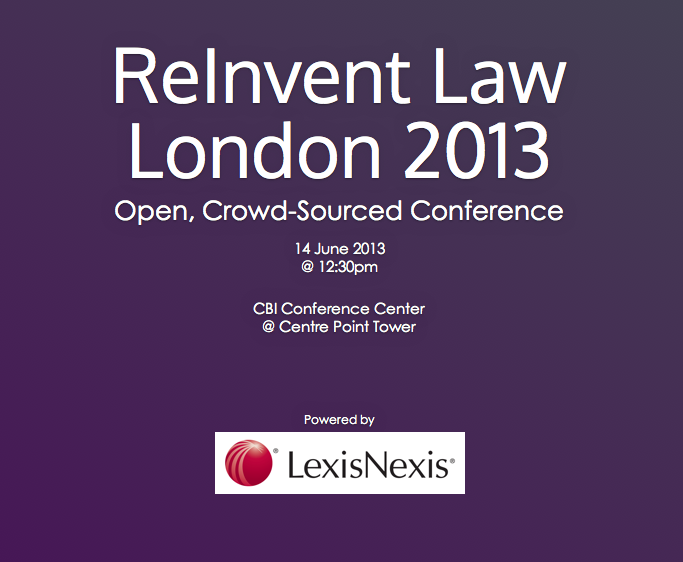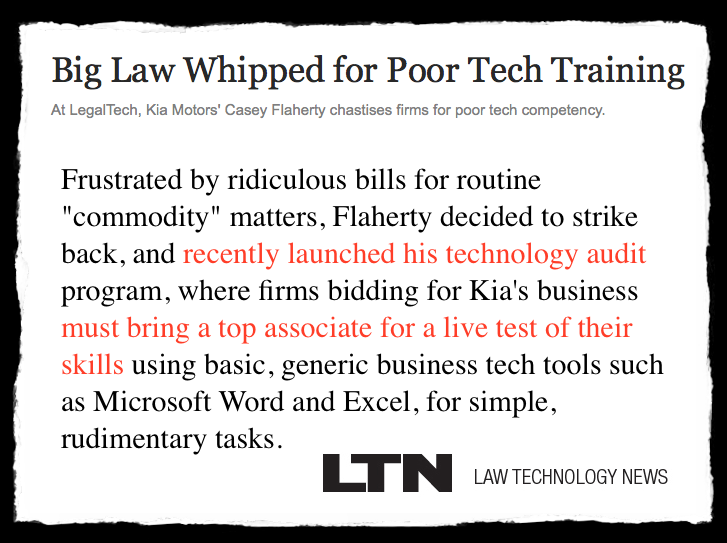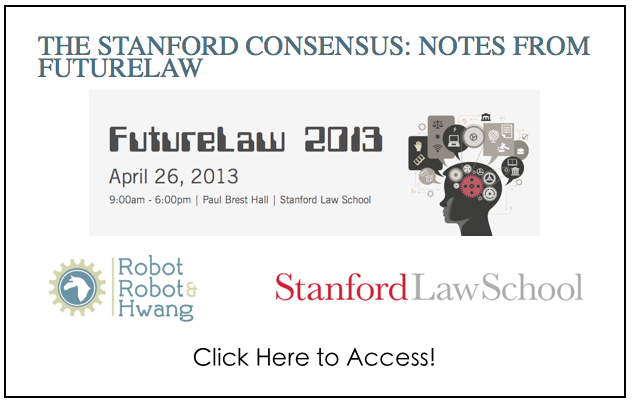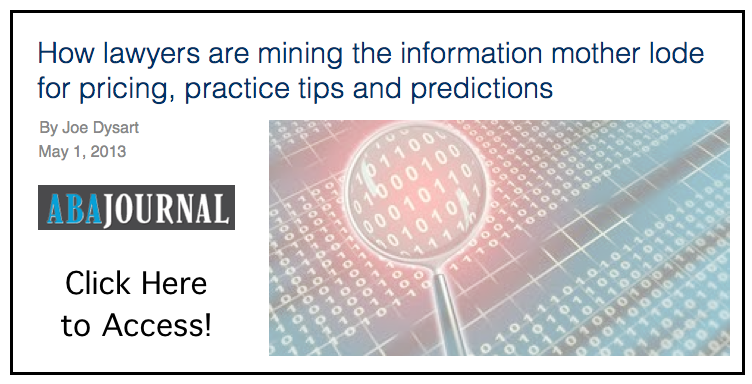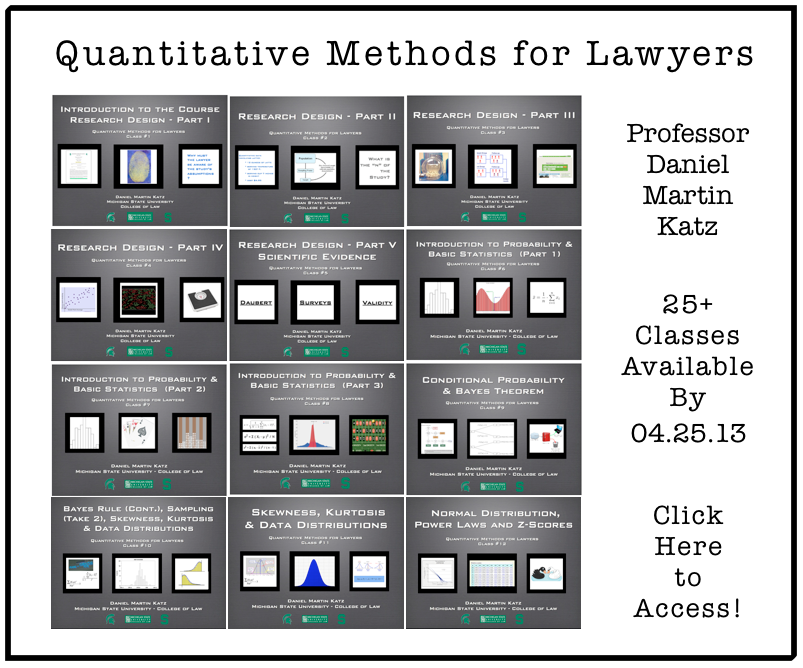Tag: law schools
Honored to Be Named to the Fastcase 50 – Innovative Thinkers in Law
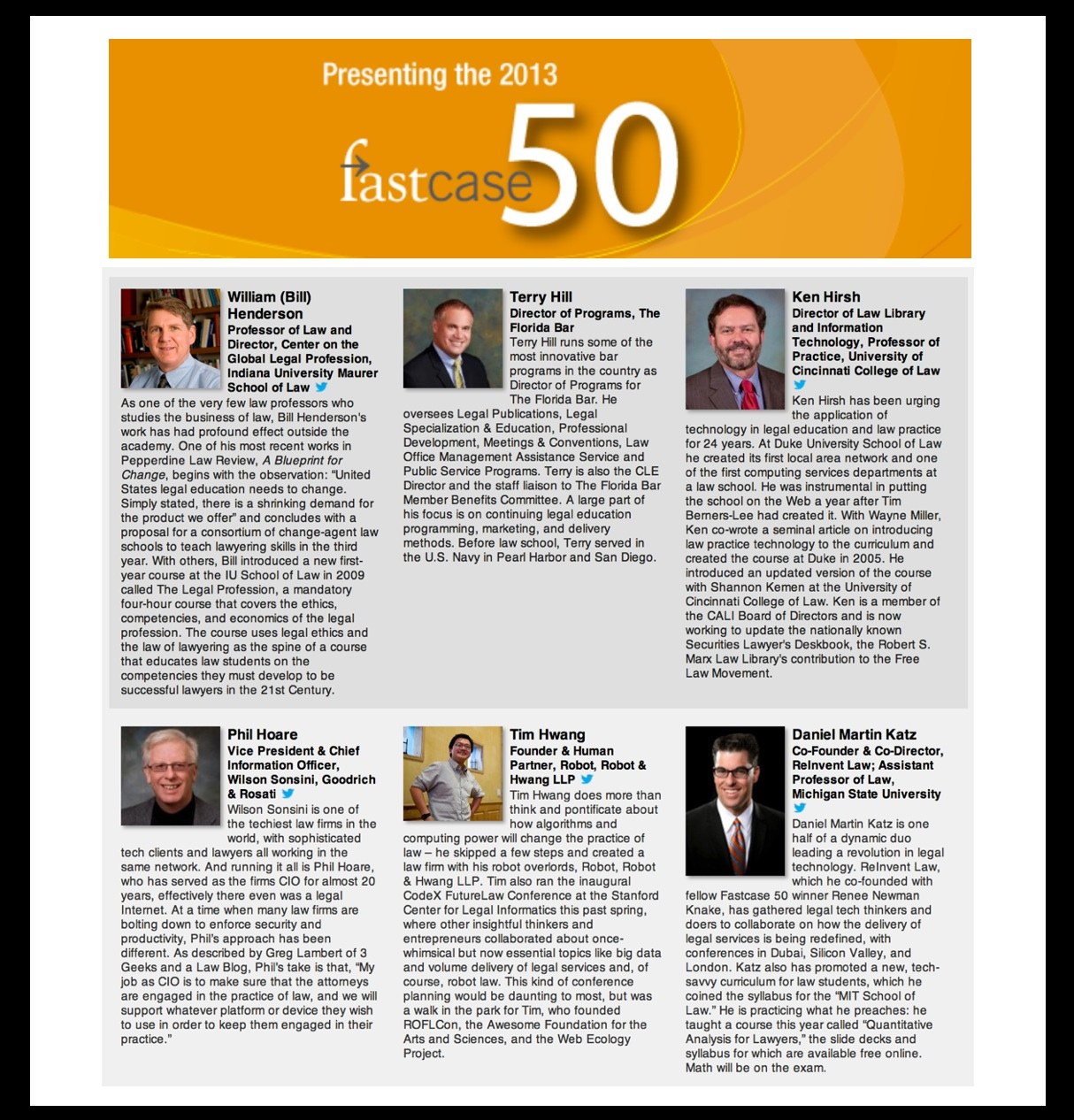 From the Announcement: “2013 was the Year of Reinvention, with innovators gathering at several national conferences pushing the boundaries of the business of law, using software, algorithms, and new pricing models for lawyers as a way to better provide legal services to the middle class. New companies challenged our assumptions about legal research, and established challengers hit their stride as much larger enterprises. Bar associations and law professors sought to change some of the most traditional legal organizations serving law students and lawyers. The Fastcase 50 classes of 2011 and 2012 were an inspiration. This year, you submitted a record number of nominations, and we are pleased to honor the Fastcase 50 Class of 2013.”
From the Announcement: “2013 was the Year of Reinvention, with innovators gathering at several national conferences pushing the boundaries of the business of law, using software, algorithms, and new pricing models for lawyers as a way to better provide legal services to the middle class. New companies challenged our assumptions about legal research, and established challengers hit their stride as much larger enterprises. Bar associations and law professors sought to change some of the most traditional legal organizations serving law students and lawyers. The Fastcase 50 classes of 2011 and 2012 were an inspiration. This year, you submitted a record number of nominations, and we are pleased to honor the Fastcase 50 Class of 2013.”
I am honored to have been named to this list for 2013!
Some Brief Thoughts on “The Failure of Crits and Leftist Law Professors to Defend Progressive Causes” {By Brian Tamanaha)
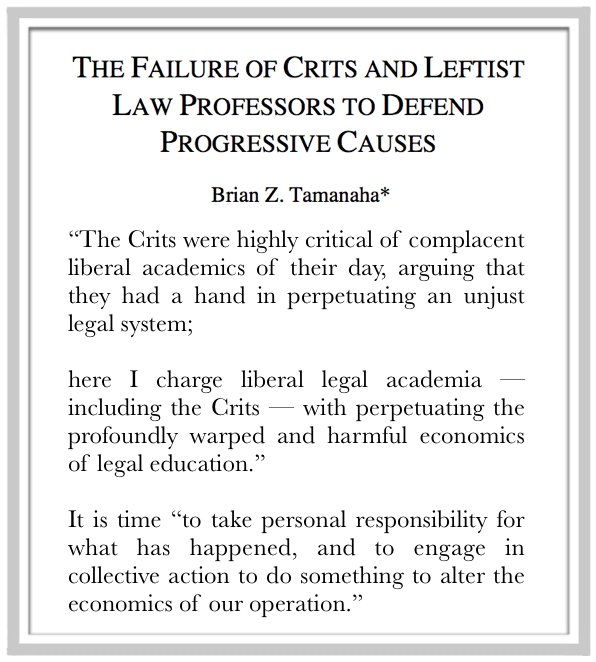 Obviously, this account could be generalized beyond the Crits to many other groups of law professors. However, the Crits should be particularly singled out because they should have been all over this topic. As a group – they have collectively failed.
Obviously, this account could be generalized beyond the Crits to many other groups of law professors. However, the Crits should be particularly singled out because they should have been all over this topic. As a group – they have collectively failed.
In his article – Practicing Theory – the late Larry Ribstein noted “legal education has developed in a hothouse, insulated from markets by licensing laws and accreditation standards. The hothouse walls are falling, leaving law schools to cope with markets.” Larry’s was absolutely correct and the question at this point … is how to go forward.
We do need some radical thinking on the question but the crits are generally speaking – nowhere to be found. Indeed, at least some of them are even arguing in favor of more liberal arts style legal education (as if having even more liberal arts style law classes was going to help get a law student a job). The pendulum has swung way too far in that direction.
As I outlined in my Keynote Speech at the Stanford CodeX Future Law Conference, what is NOT needed is for law schools to double down on liberal arts legal education. What is actually needed (in terms of giving their students the opportunity to have reasonable labor market outcomes and the skills that are actual in demand in today’s and tomorrow’s labor market) is a polytechnic style of legal education. I have outlined my thinking on these questions under the umbrella of a so called “MIT School of Law.”
Here at MSU Law – under the flag of the ReInventLaw Laboratory – we believe that part of the solution to the crisis currently facing the law profession and legal education involves leveraging technology, legal analytics, design thinking, entrepreneurship and the advent of new, process-driven delivery models. Given there will never be civil version of Gideon, the (plausible) solution to the access to justice problem in the United States is a market driven combination of substantive expertise and the skills described above {law + tech + design + delivery}. Check out the ReInventLawChannel for just a few examples …
The hothouse walls are down and the race for the future is underway. But the point of all of this should be our students and their lives in the law … somewhere along the way team crit lost sight of this fact. It is time for them (and everyone else) to refocus and get in the game. The future is NOT self executing. It is up to all of us to go make it happen!
International Conference on Artificial Intelligence and Law (Rome 2013 – Registration is Now Open!)
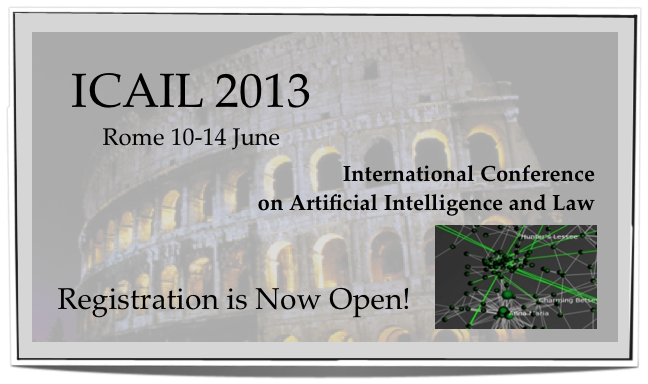 As a member of the AI+Law 2013 Program Committee it is my pleasure to invite you to attend the International Conference on Artificial Intelligence and Law – Rome 2013 — June 10-14. The conference will feature the core program of peer reviewed papers, research abstracts and project demos. In addition, the conference features two days of workshops and tutorials in topics such as Computational Models of Natural Argument, Textual Extraction from Legal Resources, Machine Learning in E-Discovery, Network Analysis in Law, XML Schemas for Legal Rules, Data Driven Artificial Intelligence in Law, etc.
As a member of the AI+Law 2013 Program Committee it is my pleasure to invite you to attend the International Conference on Artificial Intelligence and Law – Rome 2013 — June 10-14. The conference will feature the core program of peer reviewed papers, research abstracts and project demos. In addition, the conference features two days of workshops and tutorials in topics such as Computational Models of Natural Argument, Textual Extraction from Legal Resources, Machine Learning in E-Discovery, Network Analysis in Law, XML Schemas for Legal Rules, Data Driven Artificial Intelligence in Law, etc.
I hope to see you in Rome this Summer for AI+Law 2013!
Workshop “Network Analysis in Law” @ International Conference on Artificial Intelligence and Law – Rome 2013
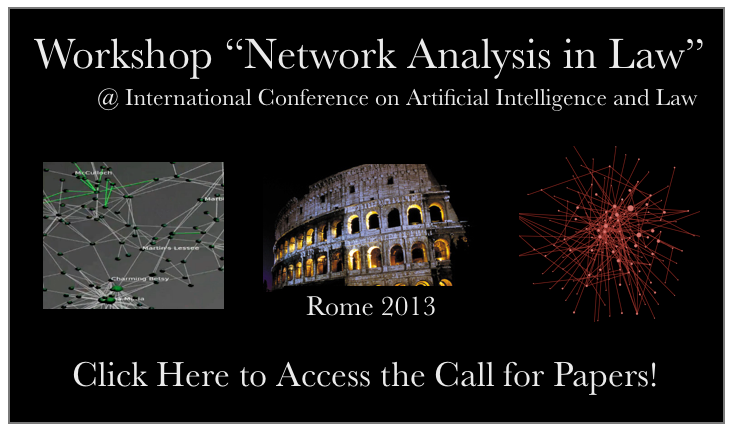 This Workshop builds upon the “Network Analysis and the Law” Tutorial that Mike Bommarito and I ran at Jurix 2011 in Vienna.
This Workshop builds upon the “Network Analysis and the Law” Tutorial that Mike Bommarito and I ran at Jurix 2011 in Vienna.
It was a great honor to be an organizer for both the overall Artificial Intelligence and Law 2013 Conference as well as the Network Analysis and Law workshop.
Looking forward to great week of rigorous technical papers at Artificial Intelligence and Law 2013 in Rome in early June!
ReInvent Law London 2013 – A Free, Open & Crowd Sourced Conference – June 14, 2013 in Central London
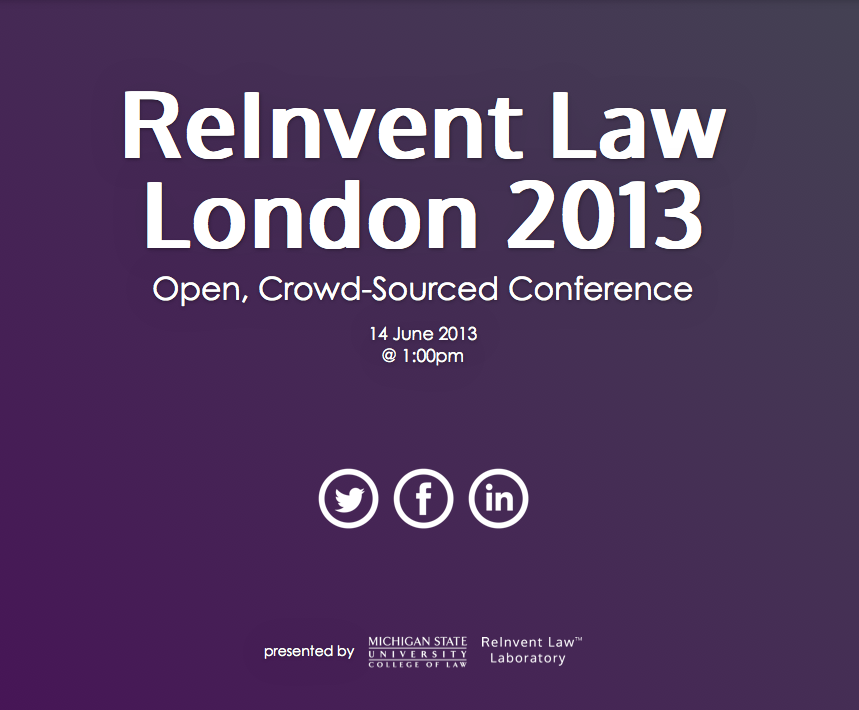
#ReInvent Law London 2013 will be an open, crowd-sourced conference! Talks will be submitted by the public and then those proposals will be voted upon by the public. Anyone can pitch a topic, and everyone can vote.
Here are the rules:
1. Submit your 300-word or 30-second-YouTube-video pitch at www.ReInventLawLondon.com between now and midnight on April 5, 2013.
2. Vote for your favorite pitch when the voting window opens in early April. One person, one vote—but feel free to use Twitter, Facebook and LinkedIn to encourage colleagues, friends, family and more to vote for your pitch.
3. Talks must relate to some aspect of law + technology + innovation + entrepreneurship. This is about big ideas—no sales pitches or product pushing.
4. Winners will have up to 10 minutes to speak, and will then respond to dynamic, real-time, audience-driven Q&A.
5. You can also sign up here for a FREE ticket to witness ReInvent Law London, June 14, 2013. Each of our previous events have sold out – so sign up today!
#ReInventLaw London 2013 is part of Michigan State University College of Law’s 21st Century Law Practice Summer Program.
Learn more about our laboratory and its 4 pillars — { Law + Tech + Design + Delivery }
@ www.ReInventLaw.com
Open Law Lab (By Margaret Hagan)
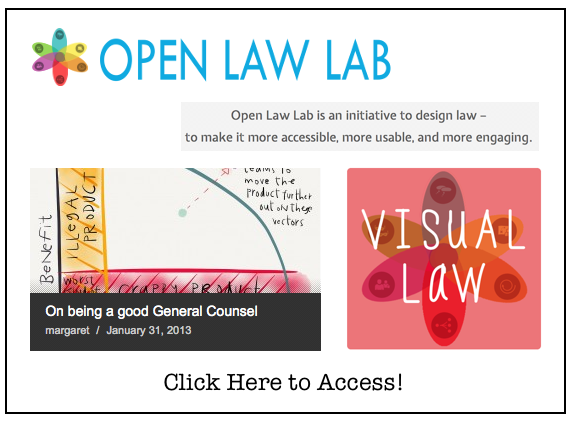 Check Out – Open Law Lab (By Margaret Hagan – Student @ Stanford Law School). This is a welcome addition to the small but growing list below. However, this one is particularly important because it is entirely student created and driven!
Check Out – Open Law Lab (By Margaret Hagan – Student @ Stanford Law School). This is a welcome addition to the small but growing list below. However, this one is particularly important because it is entirely student created and driven!
- The Law Lab @ Harvard’s Berkman Center
(John Clippinger & Oliver Goodenough)
{To my knowledge, this is the first law laboratory ever created} - #ReInventLaw Laboratory @ Michigan State Law
(Daniel Katz & Renee Knake)
{We were the second law lab — founded in Early 2012} - Legal Innovation Lab @ Northeastern Law
(Luke Bierman & Martha Davis)
{This is the third lab — founded in the Fall 2012}

